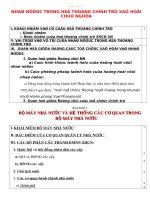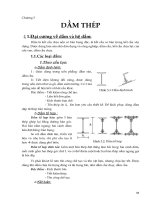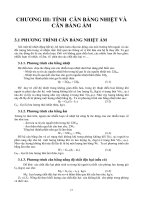PASSAGE 3
Bạn đang xem bản rút gọn của tài liệu. Xem và tải ngay bản đầy đủ của tài liệu tại đây (44.17 KB, 4 trang )
PASSAGE 3
Television, like language, can be a cultural challenge for better or worse, and this is what it is in many of
its activities, whether voluntarily or, on occasion involuntarily. Although it may sometimes be soothing,
television is often provocative in the sense that it gives information and arouses interest. That being said,
the new means of broadcasting and communicating throughout the world increases the complexity of
television even further.
An important question is what television is there to do and to say. In actual fact, however, the issue does
not seem to have been put in this way by all governments and their officials, nor by private television
companies.
Since the primary aim is to get an audience (and who would want to make television programs nobody
looked at?), programs are becoming more and more standardized. The cultural challenge represented by
television must not turn into a challenge to culture. At all events, television carries massages which
influence, and will increasingly influence, trends in societies one way or another. Either television will
contribute to enriching our culture or to enabling some of these cultures to dominate others.
Undoubtedly there are outstanding events, such as broadcasts of major occasions, but the out-of-theordinary nature of a cultural message soon becomes part of life, part of the every air breathed by those to
whom the messages are sent. Living in a world of painting, literature and music is a very different thing
from the stardom of a composer, writer or performer. While the heads of television channels sometimes
display boldness, they do not seem to find it necessary to do so when it comes to music (with the
occasional exception), because they themselves are not convinced of the emotional impact of music on
television. And yet, in spite of all obstacles, music is a challenge through its daily presence. This
represents a victory for whom? Pure music – that is to say, music soberly presented through the playing of
the performers – goes down very well on the small screen. Its presence on television makes it part of
everyday life.
Let us be optimistic and hope that those in charge of television of whatever kind are aware of the
importance of their function over and above audience surveys and ratings and that they will call primarily
on the talents of cultural people and give them priority over the salesman.
Question 1. What is the effect of television according to the author?
A. It causes intellectual laziness
B. It makes the viewers think.
C. It is harmful to society.
D. It confuses the viewers.
Question 2. Television’s function is to make people ___________.
A. Confused of what is happening
B. More interested in what is happening
C. More culturally oriented
D. More educated in society
Question 3. In the author’s opinion, what is wrong with the attitude of some governments to television?
A. They do not think it is important.
B. They do not pay enough attention to its function.
C. They do not use it effectively.
D. They have too much control over it.
Question 4. The influence that television may have is possibly ___________.
A. Ignored by almost everybody
B. A substantial benefit for private companies
C. Greatly considered by governments
D. An enrichment and also a challenge to cultures
Question 5. The author thinks that television programs are in danger of ____________.
A. Trying to please too many people
B. Preventing the development of society
Page 1
C. Losing their effect on our culture
D. Declining in popularity
Question 6. What are the heads of television not convinced of its impact?
A. Music
B. Literature
C. Fine arts
D. Painting
Question 7. According to the author, the heads of the television channels____________.
A. Have an adventurous approach to presenting music
B. Broadcast only important musical events
C. Do not think music is effective on television
D. Do not want music to be part of everyday life
Question 8. Music has become _____________.
A. Very important to policy makers
B. Very important to television program producers
C. Part of the cultural message
D. Part of daily life
Question 9. What does the author hope will be the future of television?
A. More popular programs will be broadcast.
B. Television controllers will change their attitudes
C. Audience will go on increasing.
D. The right kind of program-makers will be appointed.
Question 10. The best title for this passage is?
A. Television and its programs
B. The influence of televisions on governments and companies
C. The impact of television on culture
D. The standardization of television programs
ĐÁP ÁN
1-B
2-B
3-B
4-D
5-A
6-A
7-C
8-C
9-D
10-C
LỜI GIẢI CHI TIẾT
Question 1:
B. It makes the viewers think.
Thông tin ở đoạn sau: “Either television will contribute to enriching our culture or to enabling some of
these cultures to dominate others.” (Hoặc truyền hình sẽ đóng góp vào việc cải thiện xã hội hoặc cho phép
một số nền văn hóa chi phối các nền văn hóa khác.)
Question 2:
B. More interested in what is happening
Thông tin ở đoạn sau: “Television, like language, … of television even further.” (Truyền hình, giống như
ngơn ngữ có thể là thử thách văn hóa cho những điều tốt đẹp hơn hoặc tệ hơn, và điều này nằm trong các
hoạt động của nó, là tình nguyện hoặc khơng phải tình nguyện. Cho dù có lúc dịu dàng, nhưng truyền
hình thường mang tính khiêu khích khi nó đem đến thông tin và làm tăng niềm hứng thú. Có thể nói là,
phương thức phát song và giao tiếp mới trên khắp thế giới làm tăng sự phức tạp của truyền hình nhiều
hơn.)
Page 2
Question 3:
B. They do not pay enough attention to its function. Thông tin ở đoạn sau: “An important question is …
by private television companies.” (Một câu hỏi quan trọng là truyền hình làm điều gì và nói lên điều gì.
Tuy nhiên, trên thực tế, vấn đề này khơng có vẻ được các chính phủ và các quan chức hay các cơng ty
truyền hình tư nhân nhìn nhận theo cách này.)
Question 4:
D. An enrichment and also a challenge to cultures
Thông tin ở đoạn sau: “Since the primary aim is … cultures to dominate others.” (Vì mục tiêu hàng đầu là
hướng tới khán giả (và những người muốn tạo ra các chương trình mà khơng ai từng thấy), các chương
trình ngày càng được tiêu chuẩn hóa Thử thách văn hóa được mơ tả bởi truyền hình khơng được phép
biến thử thách thành văn hóa. Trong tất cả các sự kiện, truyền hình mang các thông điệp mà ảnh hưởng và
sẽ ngày càng gây ảnh hưởng, các xu thế trong xã hội theo cách này hoặc cách khác. Hoặc truyền hình sẽ
đóng góp vào việc cải thiện xã hội hoặc cho phép một số nền văn hóa chi phối các nền văn hóa khác.)
Question 5:
A. Trying to please too many people
Thông tin ở đoạn sau: “The cultural challenge … societies one way or another” (. Trong tất cả các sự
kiện, truyền hình mang các thông điệp mà ảnh hưởng và sẽ ngày càng gây ảnh hưởng, các xu thế trong xã
hội theo cách này hoặc cách khác.)
Question 6:
A. Music
Thông tin ở đoạn sau: “While the heads of television channels … everyday life.” (Trong khi những người
đứng đầu của các kênh truyền hình đơi khi cho thấy sự táo bạo, họ có vẻ khơng thấy cần phải làm vậy khi
đó là về âm nhạc (với ngoại lệ thường xun), vì chính họ khơng tin tưởng vào tác động cảm xúc của âm
nhạc với truyền hình. Và mặc cho tất cả rào cản, âm nhạc vẫn là một thử thách trong hiện tại. Điều này
đại diện cho sự thắng thế của ai? Âm nhạc thuần túy – nói là thế, âm nhạc phản ánh chân thực qua sự thể
hiện của người biểu diễn – đi xuống rõ tệt trên màn ảnh nhỏ. Sự xuất hiện của nó trên truyền hình khiến
nó trở thành 1 phần của cuộc sống.)
Question 7:
C. Do not think music is effective on television
Thông tin ở đoạn sau: “: “While the heads of television channels sometimes display boldness, they do not
seem to find it necessary to do so when it comes to music (with the occasional exception), because they
themselves are not convinced of the emotional impact of music on television.” (Trong khi những người
đứng đầu của các kênh truyền hình đơi khi cho thấy sự táo bạo, họ có vẻ khơng thấy cần phải làm vậy khi
đó là về âm nhạc (với ngoại lệ thường xun), vì chính họ khơng tin tưởng vào tác động cảm xúc của âm
nhạc với truyền hình.)
Question 8:
C. Part of the cultural message
Thông tin ở đoạn sau: “Pure music – that is to say, music soberly presented through the playing of the
performers – goes down very well on the small screen. Its presence on television makes it part of
everyday life.” (Âm nhạc thuần túy – nói là thế, âm nhạc phản ánh chân thực qua sự thể hiện của người
biểu diễn – đi xuống rõ tệt trên màn ảnh nhỏ. Sự xuất hiện của nó trên truyền hình khiến nó trở thành 1
phần của cuộc sống.)
Page 3
Question 9:
D. The right kind of program-makers will be appointed.
Thông tin ở đoạn sau: “Let us be optimistic … over the salesman.” (Chúng ta hãy lạc quan và tin tưởng
rằng những người có trách nhiệm trong ngành truyền hình ở bất cứ mảng nào sẽ nhận thức được tầm quan
trọng của vai trò của chúng vượt lên trên các điều tra và tỉ suất khán giả và rằng họ sẽ kêu gọi được tài
năng của những người có văn hóa và ưu tiên họ hơn những nhà kinh doanh.)
Question 10:
C. The impact of television on culture = Tác động của truyền hình đến văn hóa.
Page 4









